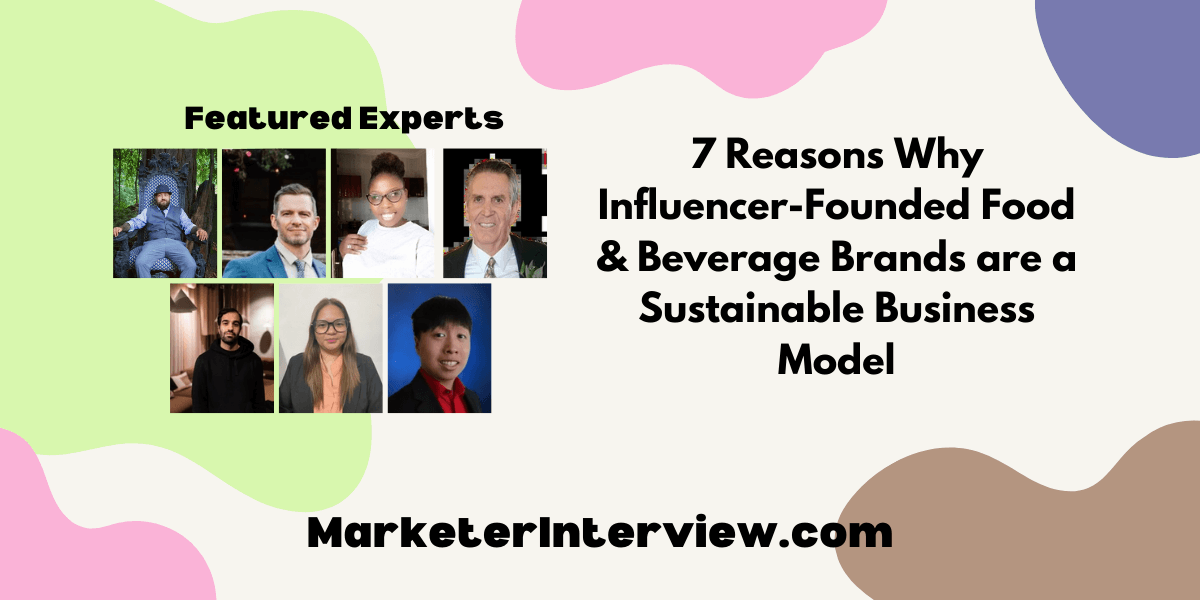7 Reasons Why Influencer-Founded Food & Beverage Brands are a Sustainable Business Model
Exploring the viability of influencer-led ventures in the food and beverage industry if it is a sustainable business model, we sought insights from marketing experts and entrepreneurs. From the importance of quality over celebrity status to the potential longevity exemplified by celebrity chefs, discover the diverse perspectives of seven professionals on whether influencer-founded brands are a sustainable business model.
Want to get quoted in MarketerInterview.com content just like this? Apply to become a contributor today!
Contents
- 1 Quality Trumps Celebrity in Sustainable Business Model
- 2 Authentic Connections Foster Brand Loyalty
- 3 Audience Loyalty Versus Operational Expertise
- 4 Influencers Offer Noticeable Brand Advantage
- 5 Fame-Dependent Brands Risk Sustainability
- 6 Influencer-Based Brands Lead in Fitness Industry
- 7 Celebrity Chefs Prove Longevity Possible
Quality Trumps Celebrity in Sustainable Business Model
There will always be exceptions to the rule when it comes to sustainability. The market of influencer-founded food and beverage businesses is increasingly crowded. Brands heavily tied to an individual’s image can also face challenges if the personality or influencer becomes controversial or loses credibility with its audience.
Sustainability often relies on quality products. Well-made food and drinks will always trump celebrity associations. The outliers will be the brands diversifying their marketing, building a brand identity, and cultivating an audience of raving product fans.

Christopher Overstreet, Marketing Strategist, Revity Marketing Agency
Authentic Connections Foster Brand Loyalty
As a food influencer and blogger myself, I firmly believe that influencer-founded food and beverage brands can indeed represent a sustainable business model.
The key lies in the authentic connection influencers have with their audience, built on trust and shared values. When influencers venture into creating their own brands, they bring not only their expertise in curating appealing content but also a genuine understanding of their followers’ preferences. This inherent understanding can translate into products that resonate with consumers, fostering brand loyalty.
Also, influencers often have a direct line of communication with their audience through social media, allowing for real-time feedback and agile adaptation to market trends. The personal touch and relatability that influencers bring to their brands can be a strong foundation for long-term success and sustainable business model in the competitive food and beverage industry.

Thanh Dang, Influencer and Founder, Food Senpai
Audience Loyalty Versus Operational Expertise
I believe that influencer-founded food and beverage brands can leverage built-in audiences for the massive organic promotion of new products and be a sustainable business model. However, converting audience loyalty into long-term business sustainability remains a question mark without core operational expertise. While influencer status catalyzes viral marketing momentum and early revenue traction, mature processes across the supply chain, team, and systems still separate structurally sound firms from temporary trends.
Essentially, most influencer-based CPG plays should be viewed as needing eventual transitions to diversified, experienced leadership for scalability. The concepts and audience insights they provide may thrive long-term under a properly staffed business infrastructure. But the influencer founders themselves may not substitute for this.

Lyn Collanto, Marketing Specialist, KBA web
Influencers Offer Noticeable Brand Advantage
Yes, I really believe so. The food and beverage industry is incredibly large, no matter which market in the world you consider. However, it’s usually dominated by huge corporations that have been penetrating their brands to customers for 20-40+ years. Hence, it’s really hard for new food brands to even be noticed.
Creating a tasty product is hard, but creating a noticeable brand is much harder. Influencers have a huge advantage here since they can market their products for basically free, which will create a buzz that at least will create a chance to compete against the big corporations and can become sustainable business model.

Behrang Bandali, Founder, Freaky Sauces
Fame-Dependent Brands Risk Sustainability
They don’t represent a sustainable business model because these brands depend too much on their fame. With any bad PR outcome, the business will suffer a heavy loss.
Many influencers are out just for the money and know little about food or running it as a business. They can’t answer questions about the ingredients used in production and what type of people are allowed to eat it; for example, is it vegan-friendly?
All they are after is how to promote the brand and don’t care if it meets consumer safety standards.
So, while influencer-led food and drink brands might get attention initially, their future success is still undetermined due to these issues, and many consumers will lose interest not only in the company but in the influencer themselves.

Gary Heath, Managing Director and Founder, Dad’s Own Products
Influencer-Based Brands Lead in Fitness Industry
In our industry, which is fitness/supplement-related, the products that are “killing it” over the past year have been from the influencer-based brands. The old-school brands are lagging behind with this new strategy, and our company sees it in the sales.
Now, with the question of whether they can sustain it, these brands need to continue to build up their influencers, provide amazing content, and the key is to keep pushing out innovative products. So far, though, they have been able to do it. We see this in our monthly sales reports of our top brands.

Jeff Michael, Ecommerce Business Owner, Supplement Warehouse
Celebrity Chefs Prove Longevity Possible
I think influencers could create sustainable business model for food and beverage brands. Several of the best-known restaurants were created by celebrity chefs, and some of these restaurants have been popular for decades. One example is Wolfgang Puck.

Eric Novinson, Founder, This Is Accounting Automation
Want to get quoted in MarketerInterview.com content just like this? Apply to become a contributor today!






